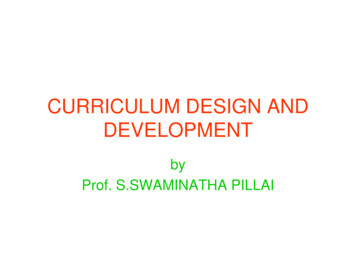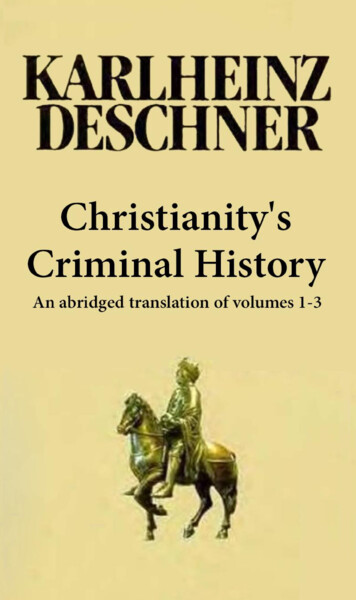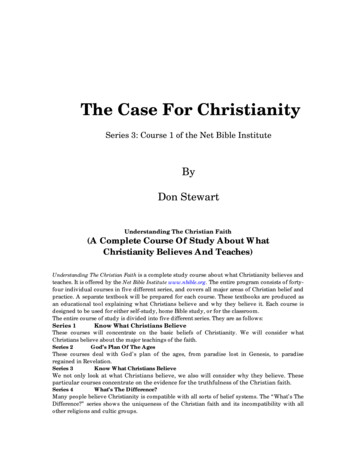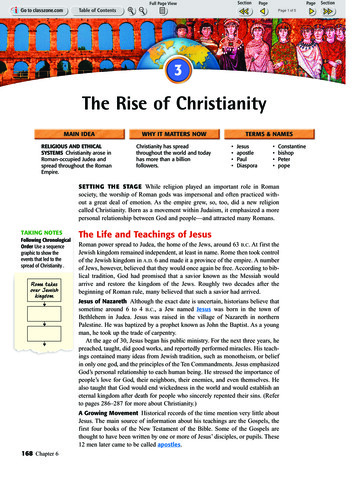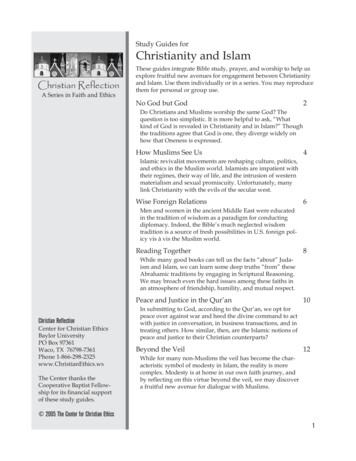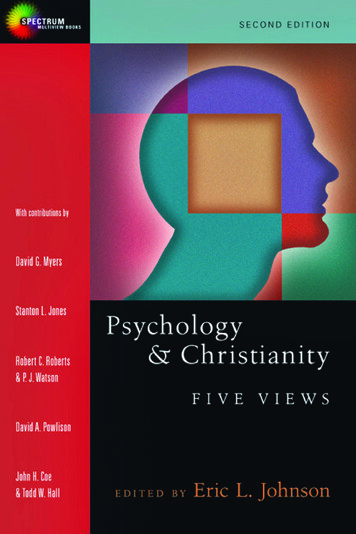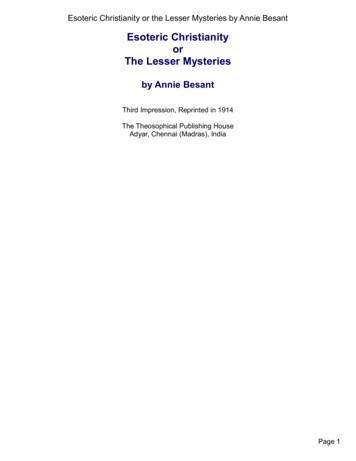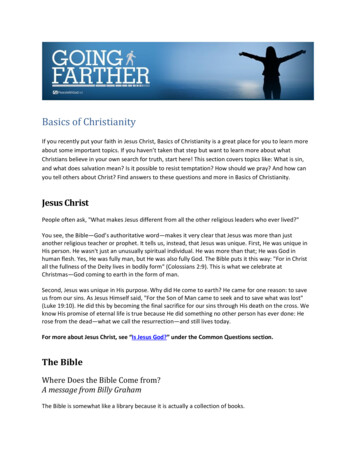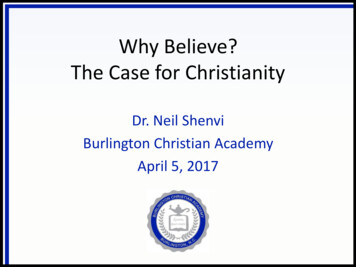
Transcription
': y'\
s
Digitized by the Internet Archivein2007 with funding etails/christianityandtOOeucl iala
Harper's Library of Living Thought
CHRISTIANITYANDTHE NEWIDEALISMBYRUDOLF EUCKENHARPER KBROTHERSLONDON ?iNEWYOEK
CHRISTIANITYAND THENEW IDEALISMA STUDY IN THE RELIGIOUS PHILOSOPHYOF TO-DAYBYRUDOLF EUCKENPROFESSOR OF PHILOSOPHY IN THE UNIVERSITY OF JENAAWARDED THE NOBEL PRIZE FOR LITERATURE IN 1908TRANSLATED BYLUCY JUDGE GIBSONCLASSICALAND ORIENTALTRIPOSES, CAMB.ANDW.R.BOYCE GIBSON,M.A. (OXON.)PHILOSOPHY IN THE UNIVERSITY OF LONDOMAUTHOR OF 'RUDOLF EUCKEN'S PHILOSOPHY OF LIFE,' ETC.EXAMINERINLONDON AND NEW YORKHARPER & BROTHERS45ALBEMARLE STREET,1912W.
First Edition.Second Edition.OctoberiqoqJanuary igt2
PREFACE TO THE FIRST ANDSECOND EDITIONSTHISbookthe outcome of lectures givenisat Jena on October 23 and 24, 1906, in connection with the Theological Vacation Course.These lectures grappled with certain problemswhich deal with the sharp oppositions thatperplex our life to-day, and therefore seem tocall very specially for elucidation.In the courseof our inquiry we have sought to show as clearlyas possible what these oppositions are, and havedone our best to surmount them.The first lecture deals with the grounding ofreligionlectureinisthelife.Our aim insome mean between theinnerto findthisolderthought which favoured the cosmological approach to religion, and the newer which takesthe human soul as its starting-point, but is soliable to the defects of vagueness and formlessness.Over against both these methods we proceed toelaborate a system which, while based on theinner life, still preserves a cosmic character.In this way a clear distinction is drawn between
PREFACEa religion of the spiritual life and a religion thatis merely humanistic.The subject of the second section is " Religionand History."Thereishardly anything sosig-nificant for the position of religion to-day as thetendency to refer continually to history. Whatever the advantages of such reference, we mustnot ignore its dangers.It was incumbent onus to weigh them well, and in particular to ascertain whether it were possible to overcome theevils of a stifling and enervating fhistory in opposition to a radicalism which ishostile to it.This we could not do withoutframing certain fundamental convictions as tothe meaning of history which shed a new lighton the picture of life as a whole, and thereforeconcern each of us individually.Lastly, the incessant disputes wagea to-dayover the nature and value of Christianity ?thequestionThe main fimctionofphilosophy in the matter is to bring out thespiritual character of the Christian Faith, and discuss the type of life peculiar to it. We must reacha conception which is sufficiently broad to takein all that is vital to the temper of this Faithand allowitfullfreedom to develop; while yetto afford clear guidance tosufficiently definite
PREFACEthought and life, and stand as a protest againstthe mischievous vagueness so prevalent in thetreatment of these matters to-day. Our discussiontakes us back to that which is most fundamentalin life, and seeks at the same time, through a briefhistoricalapergu, tosum up andappreciate thepart which Christianity has played in the world'sThroughout we expressly defenddevelopment.the right of the modern world to shape Christianity in its own way.While our inquiry presupposes a systematicit is yet couched in aseasy and intelligible terms as the case admitted,and addressed not merely to academic circles,but to all who, to-day, amid the prevalentphilosophical position,spiritual confusion,problem ofarestillconcerned with thereligion and, in the treatment of thisproblem, desire freedom without shallowness anddepth without immobility.
PREFACE TO THE THIRD EDITIONTHE changethefirstinthe third edition, so far asthree sections of the subject areconcerned, amounts to no more than an occasionalsimplification of the style.Butas I recast thematter in my mind, and re-read these sectionswith a freshened insight, I received the impressionthat whilst the individual sentencesrecordedmystillfaithfullytrue convictions, the effect of thewas to make my views tallydo with the traTheditional, ecclesiastical form of Christianity.need which we feel for new forms of religiousand Christian life was not sufficiently emphasised.workmoreas a wholeclosely than they reallySincerity,itseemed,requiredthatIshouldbring out the real divergence more clearly, andit is in response to this requirement that I haveadded a new section to the presentedition.Rudolf Eucken.Jena, May, igog.
TRANSLATORS' PREFACETHEfollowing translation of the work ofProfessor Eucken, entitled " Hauptproblemeder Religionsphilosophie der Gegenwart," followsGerman edition. The Englishand the New Idealism"suggested to us by the Rev. Dr.closely the third"Christianitytitle,originallyMaldwyn Hughes—hasthe author on the the express approval ofground thataccuratelyitdesignates the central topic of the work, particularlywhen we takeaddedWeinto account thenewsectionin the third edition.have the author's sanction alsothree "light divergences from the(i)'On pageiforGermantwo ortext.the phrase immediately following"What is Christianity ? " arisesthe wordsnaturally out of the adding of thenewsection in the third edition.(2)page 2 the word " Unerkennbares " (lit.unknowable) is translated by the termOn"unfathomable";contextthepurportofthebeing that beyond the finite orexhaustible stretches ininfinite or inexhaustible.alldirections the
PREFACE(3)On page18 the phrase "there is no necessary incentive to religious aspiration " isthe translation of a slightly modified formof the (jerman original which the authorhimself suggested as conveying his truemeaning moreexplicitly than the corresponding terms of the original version.The translators' best thanks are due to ProfessorEucken for so cordially considering and answeringa number of troublesome little questions, and alsofor his most valuable co-operation in the revisionof the proofs,L. J. G.W. R.B. G.
CONTENTSPAGBPreface to the First and Second EditionsPreface to the Third Edition.Translators' PrefaceI.viixxiReligion as Grounded in the Inner LifeRejection of a merely emotional religion.i— The essence—The independence of the—The fundamental of ReligionStages of the Spiritual Life — The Spiritual Life inof the Spiritual LifeSpiritual LifeconflictfactAper(u of the Spiritual LifeReligion and Psychologypomorphismman—The Problem of Immediacy— Personaltruth as th«II.in— Attitude towards Anthro-ground oftruth.allReligion and HistoryThe31older conception of history— The destructive influenceTheofPositivist— Historical criticismof historical criticismview of Religionmere Becoming—The— Thenothingnesshistory of Natureand of—The significance ofparticular epochs and persons — Rejection of merehistoricity — Criticism of the older method — Transitions within the Spiritual Life — Transitions withinthe world of thought — Change in the emotionaltone of— Diff"erence between New and OldSpirit— Theeternal in historylifeProblems and Anticipations.
CONTENTSrxcBIII.WhatisChristianity?69Statement of the Problem— Types of life— The Hindu——type Yes and No in Christianity Appreciation ofSorrow Union of human and DivineHeroic—quality of Christianitythought— Demands— Limits of historical criticism — The elementof greatness in great personalitiessignificancehuman—of the world ofcharacter of Christianity— Reconciliation ofSemitic and Indogermanic typesthe Germanic racesdifferent—The religious— The broadlya great personalityofepochs— Influence— Influence— Christianity andof Christianity onof Christianity on themodern world— Opposition between Christianity andmodem thought The unshakeable certainty of Re-—ligion—Revival of Religion at the present time—Thedisappearance of false intermediaries Retrospect.—IV.The1.2.3.4.CoxNFlict over Christianity to-dayThe anti-Christian movement.The revival of religious interest.The perplexities of the new situation.The Churches and their divisions.113
CHRISTIANITY AND THENEW IDEALISMRELIGION AS GROUNDED IN THEINNER LIFETHEfollowing lectures require an indulgenthearing.And this, largely because theirsubject-matter, by its very nature, demands amore thorough treatment and a more searchinganalysis than it is possible to give within the compass of a few lectures. But this very limitationmay have its advantages. If we can only throwout a few suggestions and present certain pointsof view, this may serve to set the main issue inclearer relief. Our intention is to begin with thepsychical basis of religion, then proceed to treatof the relation between religion and history, andlastly to discuss the question, What is Christianity,and how can it meet the difficulties it is encountering to-day ?shall thus proceed from theuniversal to the particular, from base to summit,and we hope in this way to carry one fundamentalidea through all the diversity of our treatment.To think that the discovery of a religious basisis a simple and easy matter betokens but a poorand weak conception of religion. That thereWe
THEBASIS OF RELIGIONremains beyond our sphere some dim immensitysome unfathomable depth beyond allthat our plummet can reach, is indeed scarcelyopen to dispute. But to admit this is not yet toenter into relationship with this unfathomed deep,and the admission therefore fails to give us aof Being,religion.But even if we were agreed in our conceptionUnknown, if we regarded it as a Powerof thehigher than ourselves, but including us within thesphere of its influence, we should yet be none thenearer to a religion.For it is essential to religion that the higher Power in our midst should benot merely an influence but a living Presence, andthat our relationship to this Presence should notbe just any sort of relation, but one in which ourwhole nature is involved. How we are to reachcertainty in this matter is not so obvious.Wemust first find the point of view from which theproblem can be attacked. And in order to do thissatisfactorily we must characterise afresh the concepts of hfe and reality.Now in the handling of this problem there is onepoint at least on which we are to-day unitedit isnot through scrutinising the world around us thatwe can hope to arrive at the goal we seek. Noclear demonstration of the excellency of this worldwill allow us to infer a transcendent Reason as thecause of it. The bold efforts of the Enlightenmentalong these lines have had the ground cut fromunder them by Kant's " Critique." Moreover, theexperiences of the nineteenth century have madeus so keenly alive to the brute force of fact and theresistance which all spiritual ideals must encoimter,:
THE RELIGION OF FEELINGthatwe can put no trust in this intellectual roadEven should it prove eminently success-to religion.ful,the mostitcould give would be a religious viewof the universe, not a real religion affecting thewhole man, strengthening and uphfting the soul.There has thus been a reaction from intellectualism, so that we now seek the basis of religion deepin the soulitself,in the characteristic experiencesman's inward life. An overpowering conviction persuades us that we need notwait for some other sphere than this in order toprove the reality of a higher Order, and put ourselves in relation to it. The one possible point ofdeparture is the life-process itself, and only in sofar as we bring its content and procedure intoclearer light can we realise that a new Order alreadyanddisclosures ofexists.But incontestably sound as this general ideabe, there is stiU much room for misconceptionwhen applying it in detail. In particular, there ismaythat which professes to transcendbecome a merely reactionarymovement. In other words, there are many peoplewho fly from one extreme to the other, and takerefuge from the objectivity of intellectual workin the subjectivity of mere feeling, in the selfabsorption of a soul detached as far as possibleIn thisfrom the experience of the world.self-centred life there are many needs to bemet, many claims to be adjusted, and such as present themselves with greatest insistence and brookno denial seem entitled to look confidently forsatisfaction.In particular it would seem that wewere justified in trusting to the reality of that whicha dangerlestintellectualism should
THEBASIS OF RELIGIONappears necessary to our moral self-preservation.But this brings us straight to religion, since only aPower that is not of this world can guard us fromthe perils of an alien and hostile Order,In pursuing this train of thought it is by nomeans easy to distinguish concisely between rightand wrong, necessary and problematic. So much,however, we may assert : that there is here gravedanger of falling into mere subjectivism. To makean inference from man to something beyond manis allowable only when man is more than a merepoint over against the infinite, when it is possibleto distinguish in him a particular and a universalaspect, and to show that inwardly he participatesIf he is to have those universalin a cosmic life.experiences which religion demands, he musthave inward kinship with a universe. The worldwithout can only be matched and overcome by anorganised world of spiritual origin.If, on theother hand, man is severed from all connexion witha universal life and is shut up to an isolated existence of his own, then, though he may build up arealm of wishes, hopes, and fancies, he can nevermake it real and authoritative for humanity.Yet that there is some superhuman Power at workwithin us, lifting us above the narrow hmits of ourprivate and particular existence, renewing us andalso transforming our relations to our fellow men,is the supreme truth for which religion stands.Itis through realising in ourselves the stirrings andimpulses of the larger life that we win access to experiences of a universal nature. But if the Subjectbe taken in abstraction from the world, thenVoltaire's dictum holds good, and the strength of
THE RELIGION OF FEELINGa needsatisfied.isno proof whatsoever thatinfer from a need to theToshallitbesatisfactionit is possible only to him who is convincedthat reality is rationed. If this be not yet proved,then to start from the premise of human need issimply to argue in a circle.But even if we were to regard this inference as apracticable method of approach, the religion towhich it would lead us must yet inevitably fail tosatisfy the religious idea.For religion would become far too much a matter of mere feeling andmood ; it would seem to avoid all entanglementwith the great world-problems and would shrinkfrom allying itself too closely with the interests ofhuman culture. It would constitute a separaterealm, which no amount of subjective emotion andexcitement could succeed in preserving from spiritual barrenness. Man cannot be resolved into merestates of feelingthere is something objective inAhis constitution, and with this he must reckon.spiritual being, a microcosm such as he is, is forcedby a necessity of his innermost nature to concernhimself with the universe. If the intellectualisticmethod threatened to degrade religion to a mereway of viewing the world, so the method whichproceeds from mere mental states be they volitends totions, affections, or aught else soeverof:—makeofit—a mere matter of fluctuating feelingand though the latter way may show more warmthand emotion, yet it lacks breadth it offers novigorous opposition to mere subjectivism, it binds;man downtoo strictly to a merelyhumanstand-point.Thereisclearlyno gainin shiftingfrom one
THEBASIS OF RELIGIONProgressalternative to the other.ifwe succeedAndtion.inthisispossible onlysomehow transcending the opposiwe cannot do unless we are ableto pass beyond the co-existence of the variouspsychical activities, the separation of the so-calledpsycliical faculties, to a primal and independentunity of which all manifoldncss is the developmentand expression. In this unity the truth of man'sparticipation in a universal life is botmd to revealhis experience must have a cosmic signifiitselfcance. Then and then only is it possible to groundreligion in the inner life. For in this cosmic importof our experience we have indeed a guarantee ofthe presence and working of a higher Order. Thusthe real question is whether we are able, throughthe active concentration of our powers, to detectthe working of this cosmic life within us. On theanswer to this question depends the whole possibility of grounding religion within the soul.Now to this question our answer is a confidentaffirmative, and we rest our affirmation on the factare not as sensible as weof the spiritual life.might be to the importance and value of this factsimply because that which is immediately andeveryAvhere present is always liable to be taken forgranted and treated as insignificant. Thus we failto perceive and appreciate aright the marvelwhich is implied in the development of the SpiritualLife within us.In opposition to a mere series ofdetached experiences, the more primitive form ofexistence in which life is no more than a successionof momentary associations, there emerges within usan entirely new life, a life that is also a world, inwhich every single activity is sustained and ani:We6
THE SPIRITUAL LIFEmated by a common endeavour. Many indicationsgo to show that spiritual Hfe and production are nomere appendage to an akeady given reahty, butthat they are themselves the makers of a newreality.Their activity is not limited to one particular sphere, but seeks to embrace all that comesin its way. It is sensible of pain and contradictionwhen sometliing remains outside its grasp, unassimilated and unintelligible. In thought, no lessthan in action, we find clear proof that the SpiritualLife does not merely collect and accumulate, butand transforms ; that it does not rest content with the given, but ever reaches beyond it, holding forth new ends for our endeavour. Thoughtrefuses to be a mere link in the chain of causes andeffectsit steps outside the series, confronts it, andseeks to unify it.Even when gauging the externalworld, the imaginative flight of thought, piercing infinity, reaches beyond aU the bounds of sense-perception.And still more forcible and penetrating is itsanalysis of the inner life, its substitution of withnessfor nextness, its extension and deepening of theco-operative principle, its insistence, finally, on aAndsingle meaning that runs through aU things.similarly in regard to conduct. The Spiritual Lifepresents us here with certain ideals, holds beforeus a regenerated world in the light of which itit seekspasses judgment on things as they areto set the new in the place of the old, and thusoriginates a movement of immeasurable significance.Now the underlying motive of all these changesis the desire for a new world.And the distinguishing feature of the new Order is the endeavour tofind an inner unity in all the manifold variety ofimifies;;
THEBASIS OF RELIGIONthe world, to bring the individual under the swayof the Whole, to make the idea and the power ofthe Whole the effective stimulus at every singlepoint. Thus the different spheres of labour neednot wait for some coincidence of results to unitethemthey are linked from the very start inspiritual fellowship. While each man sees the worldin his own way, and has his own private opinionsand preferences, the world of Truth is one and thesame for us all, and an advance made at one particular point has an immediate value for all otherpoints and for the Whole. Apart from such inwardcommunity, how could there be any organised:realm of knowledge ? And, similarly, each individual has a different idea, varying with his temperament and environment, of what is most usefulsocial self-preservation.Butany unfolding of Spiritual Life,there there is always some Good sought, a Goodwhich is universally valid, makes a universal claim,and is the standard by which all individual actionis judged.The True and the Good soar above thepetty cliques of private interests and opinions toform one common realm and bind humanity together in a spiritual community of endeavour.The True and the Good are not mere means andinstruments of our welfareto treat them thusis to destroy them at their root.They are ratherthe revealers of a new and a nobler life, of a newforphysicalandwherever thereis:world, participation in whichdistinctionbetweenisman andthe crucial mark ofanimal, or ratherbetween the spiritual and the animal in our ownnature our unique position being, in fact, dueto our participation as spiritual beings in this—8
THE SPIRITUAL LIFEIn the case of the True and the Good,not concentrated on the external aspectsof things, nor does it rest content with a merelyexternal contact.It seeks to embrace the wholeextent of its object, to inform it, and in so doingto realise itself.Thus our thought, by reachingbeyond our mere subjective states, seeks to compass what is objectively real and adjust itself toits demands.Our feeling, again, through theexaltation of life above the natural level, can focusitself within the life of another, and, throughrighteousness and love, realise the being of anotheras a part of that larger and richer life in which weand it alike participate. Everywhere we see thesame movement at work, the same tendency tobreak away from the merely isolated point andstrive towards the infinite.Such a movementdoes not merely affect certain modifications withina scheme of Reality already elaborated ; itevolves from out its own resources a new Reality,an independent realm of inward life.Now we cannot survey this life in its generalaspect nor do justice to its unique character without raising at once the question whence comes itand what place does it occupy in the whole schemeof Reality ? It cannot possibly be a mere productIts forms and powers areof human reflection.far too unique to be in any way derivable from us.Again, it conflicts so sorely with our natural interests, it demands from us so much toil and sacrifice, such a complete revolution of our being, sucha shifting of our life-centre, that it is impossible tothink that any natural impulse towards happinesswould have led us to it. Our nature, moreover, inhigherlife.our effortis:
THEBASIS OF RELIGIONpresent condition, is utterly inadequate to thetask of giving birth to the spiritual. It is indeeddirectly oppc ed to the demands of the SpiritualLife.Where on the one hand there is dispersioninto merely isolated points, on the other there isthe demand for an inner unity. In the former casethere is but a feeble stirring of the spiritual impulsein opposition to the strong natural instinct of selfpreservation ; in the latter there is the claim tobe the fount of inspiration and the very mainspring of life.On the one hand, life remainssternly subject to the la\A's of time and space ; onthe other, there is a yearning for a spiritual andeternal Order, and a reduction of all that happensin time and space to a mere phenomenal manifestation of a more essential truth. Thus to regard the Spiritual Life as merely man's work isto destroy it at the root. It cannot be understoodsave as a development of the organised imiverse,a development which takes place in man, communicates itself to man, but is never merely man'sproduction. The Spiritual Life would be whollyincomprehensible, nor could it ever become aitspowerin us, were it not independent of us in ourmerely human capacity, if the collective lifewhich it reveals were not native to Reality itselfownand possessedof itsconnexion.Reality were not thus social incould it inspire our own movementIfintrinsic principles ofstructure, howtowards solidarity ?Such a view involves a peculiar relationship ofIn last resort, it must be thespirit to nature.same life that is active in both domains, but inthe domain of nature this life seems to be dissected10
THE SPIRITUAL LIFEinto separate threads, and limited to their mutualinterplay.It attains no self-immediacy here,nor has it any substantial content. In the SpiritualLife, on the other hand, it concentrates into aWhole, and does attain to self-immediacy. Herean inner unity andno dim, unfathomed depthfor the first time Reality winsasoul.Here thereisbeyond the life itself, but the life-process is nowthe author of being, and becomes the supportingprinciple of a world of reality.That this independence of the Spiritual Liferuns counter to received ideas we are well aware,but we must insist on it none the less firmly, forit is indeed the crucial point which determinesthe right or the wrong of all spiritual movements.For these movements, in all their ramifications,make assertions which reach beyond the sphere ofour natural life. They introduce to us a new world,an organised spiritual realm which appears assomething independent of human opinion andinclination, transcending the narrow limitationsof our specifically human condition.It may bethat we are loth to acknowledge this SpiritualLife through fear of lapsing into metaphysics,for it is precisely the modern man, with all hisvaunted freedom, who is so often the punctiliousslave of the superficiality of his age. But if we dorefuse to acknowledge it, and yet seek for truth,seek to maintain any truth whatsoever, then weare denying the very principle of that which weproceed to assert, nor can we ever muster om"forces bravely and press forward to victory.Here we have the shibboleth which divides mankind, for the ambiguous answer which is ordinarily
THEBASIS OF RELIGIONreturned to these questions Is being absolutelybarred out by the most recent developments ofthought.As for him who denies the SpiritualLife and its independence, he should at leastknow that he is reducing everything outside thelimits of natural existence and social conventionto a mere empty conceit, and that concepts suchas truth and goodness have for him no shadow ofvalidity.But whattive positionof the man who takes up the affirmaand recognises in the Spiritual Lifean independent cosmic power ? Has he therebyproved the truth of religion ? Hardly. For themere existence of a power superior to man is avery insufficient basis for religion. Religion requires that this power, in all its fulness, should belivingly manifest in us, opposing the life whichwould otherwise be oursand so far we havedone no more than reach a starting-point for ourquest. We have but shown the possibility of thismanifestationit still remains to prove its reality,and this cannot be done otherwise than by showing that life is actually progressing beyond the;:position hitherto considered, that this transcendentpower is revealing itself as a uniquecreative force within our human existence, thuslifting life on to a higher plane.That such is the fact we again assert unhesitatingly, for we see that the Spiritual Life doesnot merely affect us indirectly through its results,that it does not come to us in fragments or claimmere fragments of our being, but that it transmitsitself to us in its totality, becomes wholly ours,and at the same time springs forth in us as fromspiritualla
THE GREAT RELIGIOUS FACTa fountain-headour existence is completelytransformedwe are lifted to the dignity of beingstarting-points for a universal life that is infinite:;;we become joint supporters of theSpiritual world, joint workers in the establishment of a realm of Reason. Different epochshave different ways of expressing this change.The ancients spoke of an independent reasonin man ;the early Christians of the price-in characterlessvaluemodern erapersonalityofitandeachisindividualsoul.Inby the value we attachspiritualindividuality thatourtoweattest our belief in man's intrinsic independence, and show that we do not regard himas a mere link in the chain of causes and effects.the utmost importance to freeconcepts of personality and individualityfrom the vague ambiguities which cling to themto-day, causing us to regard as a natural endowment that which can be acquired only throughexperience of a world-context. The mere fact ofour life's manifold activities being grouped roundsome centre does not in itself take us very far.It may, indeed, mean no more than a strengtheningof our natural life, binding us to it more closelythan before. It becomes important only whenthe concentration betrays the influence of an inIt is, of course, ofthedependent Spiritual Life which admits man toshare in its infinity, and, in the process of revealingitself, enables him to attain a newer, richer, truerpersonality.It is only on the basis of a personal life so understood that we can explain the formation within usof a spiritual individuality and appreciate its13
THEBASIS OF RELIGIONNever could the contingent succession of particulars which marks the state of natureclaim to have a value, and to maintain itselfagainst all opposition ; never could such a merecongeries of events or experiences give birth toan inner unity.Only when life has been re-significance.fashioned and haswonitsindependence doesitbecomepossible to strive after such unity. Then,indeed, the building up of an individuality becomes infinitely important, as a wonderful andunique embodiment of the Spiritual Worldthewinning of an individuality is in itself an extensionof the spiritual realm. But at the same time personality and individuality, from being so-called:facts, become difficult problems, problems whichembrace the whole of life and keep it incessantlyactive.In the context here indicated the movementpersonality and individuality cannotpossibly be interpreted as a withdrawal from thegreat world to a lonely cell, as a glorying in anisolated self-sufficiency. It must rather mean thewinning of a life spiritual in origin, that wouldfain compass the whole infinitude of Being, drawthe world to itself and fashion it afresh from itsown centre. As a spiritu
christianity newidealismandthe astudyinthereligiousphilosophy ofto-day by ru

